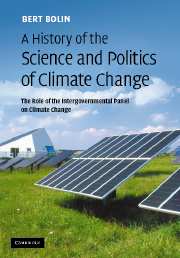 A History of the Science and Politics of Climate Change
A History of the Science and Politics of Climate Change Book contents
- Frontmatter
- Contents
- Foreword by Bo Kjellén
- Abbreviations
- Part I The early history of the climate change issue
- Part II The climate change issue becomes one of global concern
- 5 Setting the stage
- 6 The scientific basis for a climate convention
- 7 Serving the Intergovernmental Negotiating Committee
- 8 The IPCC second assessment report
- 9 In the aftermath of the IPCC second assessment
- 10 The Kyoto Protocol is agreed and a third assessment begun
- 11 A decade of hesitance and slow progress
- Part III Are we at a turning point in addressing climate change?
- Some concluding remarks
- Notes
- References
- Name index
- Subject index
10 - The Kyoto Protocol is agreed and a third assessment begun
Published online by Cambridge University Press: 03 May 2010
- Frontmatter
- Contents
- Foreword by Bo Kjellén
- Abbreviations
- Part I The early history of the climate change issue
- Part II The climate change issue becomes one of global concern
- 5 Setting the stage
- 6 The scientific basis for a climate convention
- 7 Serving the Intergovernmental Negotiating Committee
- 8 The IPCC second assessment report
- 9 In the aftermath of the IPCC second assessment
- 10 The Kyoto Protocol is agreed and a third assessment begun
- 11 A decade of hesitance and slow progress
- Part III Are we at a turning point in addressing climate change?
- Some concluding remarks
- Notes
- References
- Name index
- Subject index
Summary
The role of the IPCC at the third conference of the Climate Convention in Kyoto in December, 1997. Political polarisations increase, while preparations for a third assessment begin.
Central themes of the Protocol
It soon became obvious that the Kyoto conference was going to be very important in that concerted efforts might be made to reach agreements on binding commitments regarding the future mitigation of climate change. I was reasonably optimistic, since hopefully the delegates were aware of the key conclusions that had been reached by the IPCC in its second assessment, although the controversies during 1996 and 1997 had had an effect on the readiness of parties to commit themselves particularly USA, though countries are in general not easily convinced to do so.
Some 9000 participants gathered in Kyoto for the two weeks that the conference was scheduled to last. Although a number of countries had sent quite big delegations, most of those attending were journalists and representatives of various non-governmental organisations. My summary of the outcome of the conference, as I viewed it at the time, was published in Science a few weeks after the end of the conference (see Bolin (1998)). A somewhat modified version of this summary constitutes Sections 10.1–10.4.
Scientific issues were not much discussed in Kyoto. I addressed the Conference on the first day, an IPCC press conference was arranged, and the new IPCC chairman, Dr Robert Watson, addressed the conference during the ministerial segment. The IPCC reports had been used by the delegates during their preparations for the Kyoto Conference as being the most authoritative analysis of climate change (see IPCC, 1996a, b, c, d).
Instead, political and technical issues were in the spotlight.[…]
- Type
- Chapter
- Information
- A History of the Science and Politics of Climate ChangeThe Role of the Intergovernmental Panel on Climate Change, pp. 147 - 162Publisher: Cambridge University PressPrint publication year: 2007
